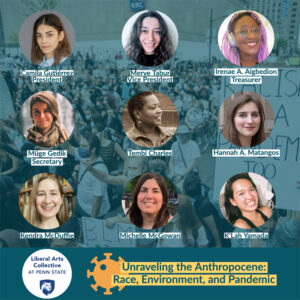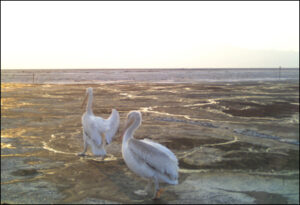This episode was recorded Friday, May 14, 2021
Co-Hosts: April Anson, Rahul Mukherjee
Featured Guests/Works:
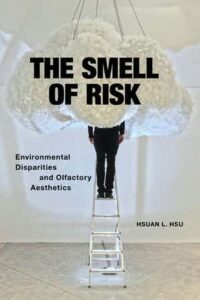 Hsuan L. Hsu, The Smell of Risk: Environmental Disparities and Olfactory Aesthetics
Hsuan L. Hsu, The Smell of Risk: Environmental Disparities and Olfactory Aesthetics
Smell has long been spurned by Western aesthetics as a lesser sense for its qualities of subjectivity, volatility, and materiality. But it is these very qualities that make olfaction a vital tool for sensing and staging environmental risk and inequality. Unlike the other senses, smell extends across space and reaches into our bodies. Hsu traces how writers, artists, and activists have deployed these embodied, biochemical qualities of smell in their efforts to critique and reshape modernity’s olfactory disparities. Drawing on ecocriticism, geography, sensory studies and critical race studies, The Smell of Risk develops a 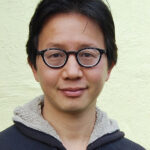 framework for understanding modernity’s differentiated olfactory ecologies.
framework for understanding modernity’s differentiated olfactory ecologies.
Hsuan L. Hsu is a Professor of English at the University of California, Davis working in the areas of American Literature, cultural geography, critical ethnic studies, sensory studies, and the environmental humanities. He is currently working on a project about racial disparities in air conditioning, thermoception, and affect.
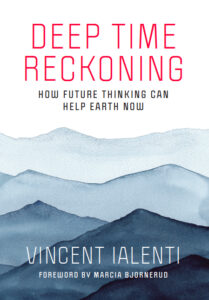 Vincent Ialenti, Deep Time Reckoning: How Future Thinking Can Help Earth Now
Vincent Ialenti, Deep Time Reckoning: How Future Thinking Can Help Earth Now
Finland’s Olkiluoto nuclear waste repository “safety case” experts have spent decades forecasting ecological and geophysical events that could, potentially, occur over the coming tens or hundreds of thousands of years. They have developed models of distant future glaciations, climate changes, earthquakes, and human-animal relationships. Drawing upon 32-months of anthropological fieldwork, Deep Time Reckoning (MIT Press 2020) explores how these experts distilled fragmentary series of hopes, calculations, fears, datasets, dreams, models, and anxieties about Finland’s socio-ecological futures into mundane artifacts of technocratic paperwork. With these futurities in view, the book suggests imaginative exercises – “reckonings” – for expanding one’s intellectual time horizons during a moment of Anthropocene political, ecological, and epistemic crisis.
 Vincent Ialenti is an Assistant Research Professor at George Washington University’s Elliott School of International Affairs, and a MacArthur Postdoctoral Fellow at University of British Columbia. Vincent’s research has been supported by the U.S. National Science Foundation, The Mellon Foundation, and The MacArthur Foundation. He has published in Social Studies of Science, Journal of the Royal Anthropological Institute, Physics Today, and Bulletin of the Atomic Scientists. Alongside his academic work, Vincent has written for NPR, Forbes, BBC Future, Atlas Obscura, and other public outlets. He holds a PhD in Sociocultural Anthropology from Cornell University and a MSc in Law, Anthropology & Society from the London School of Economics.
Vincent Ialenti is an Assistant Research Professor at George Washington University’s Elliott School of International Affairs, and a MacArthur Postdoctoral Fellow at University of British Columbia. Vincent’s research has been supported by the U.S. National Science Foundation, The Mellon Foundation, and The MacArthur Foundation. He has published in Social Studies of Science, Journal of the Royal Anthropological Institute, Physics Today, and Bulletin of the Atomic Scientists. Alongside his academic work, Vincent has written for NPR, Forbes, BBC Future, Atlas Obscura, and other public outlets. He holds a PhD in Sociocultural Anthropology from Cornell University and a MSc in Law, Anthropology & Society from the London School of Economics.
Liberal Arts Collective at The Pennsylvania State University, “Unraveling the Anthropocene: Race, Environment, and Pandemic”
Unraveling the Anthropocene: Race, Environment, and Pandemic is a podcast series in which the Liberal Arts Collective interviews academics, activists, and artists who are working to understand or document the crises that describe our contemporary moment. In our discussions, we address how global ecological crises both impact and are impacted by political turmoil, widespread outbreaks of infectious disease, and racial violence.
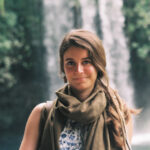 Müge Gedik will represent the LAC; she is a second-year M.A. student in Comparative Literature at the Pennsylvania State University. Her interests include modern Turkish, Latin American, and global Anglophone literatures, feminist theory, postcolonial theory and decolonization, ecocriticism, and environmental humanities. Her master’s research explores contemporary climate fiction from Turkey and Cuba within a critical framework of the Anthropocene.
Müge Gedik will represent the LAC; she is a second-year M.A. student in Comparative Literature at the Pennsylvania State University. Her interests include modern Turkish, Latin American, and global Anglophone literatures, feminist theory, postcolonial theory and decolonization, ecocriticism, and environmental humanities. Her master’s research explores contemporary climate fiction from Turkey and Cuba within a critical framework of the Anthropocene.
Gretchen E. Henderson, Life in the Tar Seeps
At Great Salt Lake near Robert Smithson’s earthwork of Spiral Jetty (1970), a motley crew of scientists repeatedly walk the mudflats to study fossils in the making. In this spare, desolate landscape, an intricate web of life unfurls: through shifting lake levels, bird migrations, microbial studies, environmental arts, and cultural histories shaped by Indigenous knowledges, overwritten by colonial legacies that persist in environmental threats. This reputedly dead sea holds “death traps” of tar seeps, or pools of raw oil, that stick together pressing questions in the climate crisis. How do we cultivate care for challenging places? How do we move beyond narrow concepts of beauty and ugliness to care for ecosystems that evolve over time? How do we confront our mortality and vulnerability to recognize kindred dynamics in our living planet? Henderson came to the tar seeps (natural asphalt) after recovering from being hit by a car while walking in a crosswalk (manmade asphalt). Like the spiraling artwork beside the tar seeps, associations of life and death, degeneration and regeneration, injury and healing, congeal for her in Life in the Tar Seeps. As she witnesses scientists, artistic curators, land managers, and students who work collaboratively to steward a challenging place, she grows to see the lake not as dead but as a watershed for shifting perceptions of any overlooked place.
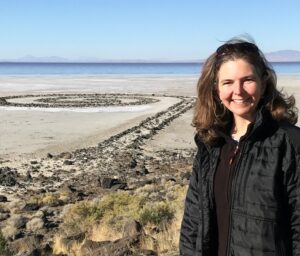 Gretchen E. Henderson is Associate Director for Research at the Harry Ransom Center at The University of Texas at Austin and the author of four books, along with arts media and opera libretti. In 2018-2019, she was the Annie Clark Tanner Fellow in Environmental Humanities at the University of Utah, with recent writing published in Ecotone, Ploughshares, Kenyon Review, and Nature Sustainability. Her book on Life in the Tar Seeps is forthcoming from Trinity University Press.
Gretchen E. Henderson is Associate Director for Research at the Harry Ransom Center at The University of Texas at Austin and the author of four books, along with arts media and opera libretti. In 2018-2019, she was the Annie Clark Tanner Fellow in Environmental Humanities at the University of Utah, with recent writing published in Ecotone, Ploughshares, Kenyon Review, and Nature Sustainability. Her book on Life in the Tar Seeps is forthcoming from Trinity University Press.

